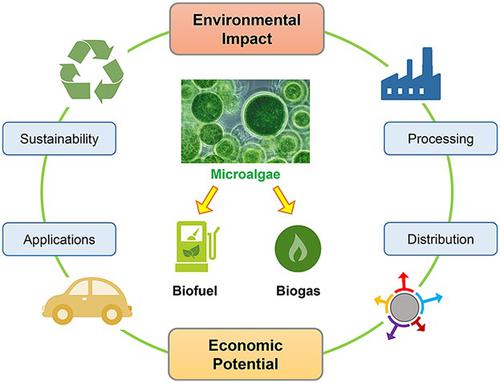当前位置:
X-MOL 学术
›
Biotechnol. J.
›
论文详情
Our official English website, www.x-mol.net, welcomes your
feedback! (Note: you will need to create a separate account there.)
Analysis of Economic and Environmental Aspects of Microalgae Biorefinery for Biofuels Production: A Review
Biotechnology Journal ( IF 3.2 ) Pub Date : 2018-02-09 , DOI: 10.1002/biot.201700618 Shir Reen Chia, Kit Wayne Chew, Pau Loke Show, Yee Jiun Yap, Hwai Chyuan Ong, Tau Chuan Ling, Jo‐Shu Chang
Biotechnology Journal ( IF 3.2 ) Pub Date : 2018-02-09 , DOI: 10.1002/biot.201700618 Shir Reen Chia, Kit Wayne Chew, Pau Loke Show, Yee Jiun Yap, Hwai Chyuan Ong, Tau Chuan Ling, Jo‐Shu Chang

|
Microalgae are considered promising feedstock for the production of biofuels and other bioactive compounds, yet there are still challenges on commercial applications of microalgae‐based products. This review focuses on the economic analysis, environmental impact, and industrial potential of biofuels production from microalgae. The cost of biofuels production remains higher compared to conventional fuel sources. However, integration of biorefinery pathways with biofuels production for the recovery of value‐added products (such as antioxidants, natural dyes, cosmetics, nutritional supplements, polyunsaturated fatty acids, and so forth) could substantially reduce the production costs. It also paves the way for sustainable energy resources by significantly reducing the emissions of CO2, NOx, SOx, and heavy metals. Large‐scale biofuels production has yet to be successfully commercialized with many roadblocks ahead and heavy competition with conventional fuel feedstock as well as technological aspects. One of the prominent challenges is to develop a cost‐effective method to achieve high‐density microalgal cultivation on an industrial scale. The biofuels industry should be boosted by Government's support in the form of subsidies and incentives, for addressing the pressing climate change issues, achieving sustainability, and energy security.
中文翻译:

分析微藻生物精炼厂生产生物燃料的经济和环境因素:综述
微藻被认为是生产生物燃料和其他生物活性化合物的有前途的原料,但是基于微藻类产品的商业应用仍然面临挑战。这篇综述着重于从微藻类生产生物燃料的经济分析,环境影响和工业潜力。与传统的燃料来源相比,生物燃料的生产成本仍然较高。但是,将生物精炼途径与生物燃料生产相结合以回收增值产品(例如抗氧化剂,天然染料,化妆品,营养补品,多不饱和脂肪酸等)可以大大降低生产成本。它还通过显着减少CO 2和NO x的排放量,为可持续能源的发展铺平了道路。,SO x和重金属。大规模生物燃料生产尚未成功实现商业化,面临许多障碍,与传统燃料原料以及技术方面的竞争也很激烈。面临的主要挑战之一是开发一种经济高效的方法,以实现工业规模的高密度微藻栽培。政府应以补贴和激励措施的形式来支持生物燃料产业,以解决紧迫的气候变化问题,实现可持续性和能源安全。
更新日期:2018-06-03
中文翻译:

分析微藻生物精炼厂生产生物燃料的经济和环境因素:综述
微藻被认为是生产生物燃料和其他生物活性化合物的有前途的原料,但是基于微藻类产品的商业应用仍然面临挑战。这篇综述着重于从微藻类生产生物燃料的经济分析,环境影响和工业潜力。与传统的燃料来源相比,生物燃料的生产成本仍然较高。但是,将生物精炼途径与生物燃料生产相结合以回收增值产品(例如抗氧化剂,天然染料,化妆品,营养补品,多不饱和脂肪酸等)可以大大降低生产成本。它还通过显着减少CO 2和NO x的排放量,为可持续能源的发展铺平了道路。,SO x和重金属。大规模生物燃料生产尚未成功实现商业化,面临许多障碍,与传统燃料原料以及技术方面的竞争也很激烈。面临的主要挑战之一是开发一种经济高效的方法,以实现工业规模的高密度微藻栽培。政府应以补贴和激励措施的形式来支持生物燃料产业,以解决紧迫的气候变化问题,实现可持续性和能源安全。





















































 京公网安备 11010802027423号
京公网安备 11010802027423号